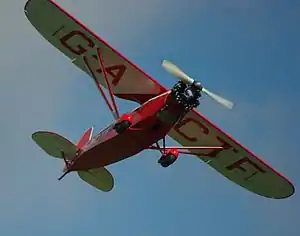Comper Swift
The Comper C.L.A.7 Swift is a British 1930s single-seat sporting aircraft produced by Comper Aircraft Company Ltd of Hooton Park, Cheshire.
| Swift | |
|---|---|
 | |
| Role | Single-seat sporting aircraft |
| Manufacturer | Comper Aircraft Company Ltd |
| Designer | Nicholas Comper |
| First flight | 1930 |
| Produced | 1930–1933 |
| Number built | 45 |
Design and development
In March 1929 Flight Lieutenant Nicholas Comper left the Royal Air Force and formed the Comper Aircraft Company to build an aircraft he had designed, the Comper Swift. He had previously designed and flown three aircraft for the Cranwell Light Aeroplane Club: the C.L.A.2, C.L.A.3 and C.L.A.4.
The prototype Swift (registered G-AARX) first flew at Hooton Park in January 1930.[1] The aircraft was a small single-seat, braced high-wing monoplane constructed of fabric-covered spruce wood frames.[2] The first Swift was powered by a 40 hp (30 kW) ABC Scorpion piston engine. After successful tests, seven more aircraft were built in 1930, powered by a 50 hp Salmson A.D.9 radial engine. Trials with Pobjoy P radial engine for use in air racing resulted in all the subsequent aircraft being powered by the Pobjoy R. The last three factory-built aircraft (sometimes called the Gipsy Swift) were fitted with de Havilland Gipsy engines – two with 120 hp (89 kW) Gipsy Major III, and one with a 130 hp (97 kW) Gipsy Major. One of the Gipsy Swifts, owned by the then-Prince of Wales and future King Edward VIII, won second place in the 1932 King's Cup Race while being flown by his personal pilot.[3] Postwar, surviving Swifts continued to compete successfully in UK air races into the mid-1950s.
Survivors
- EC-HAM Airworthy, displayed at Cuatro Vientos, Madrid, Spain. Owned by Fundación Infante de Orleans. Formerly G-ABUU, now painted to represent "EC-AAT" "Ciudad de Manila" as flown by Fernando R. Loring for his March 1933 flight Madrid-Manila.[4]
- G-ABTC Stored, in Cornwall.[4]
- G-ABUS Stored, believed in France.[4]
- G-ACGL On display, RAF Museum, Cosford.[2]
- G-ACTF Airworthy, displayed at the Shuttleworth Collection, Old Warden, England[5]
- G-LCGL Airworthy (replica)[2]
- LV-FBA Stored, in Argentina.[4] Also, a second Comper Swift flew in Argentina. Parts saved and stored in Buenos Aires after accident in San Justo 1950– Owner Vicente Bonvisutto (Reg.G-AAZE R-232 LV-YEA LV-FCE)
- VH-ACG (Gipsy engine) Airworthy[6][7] This aircraft was shipped to Oshkosh, USA for the EAA Airventure fly-in, and will be shipped back to Australia after the show.
- VH-UVC Stored, in Sydney, Australia.[8] - According to Classic Wings Magazine, VH-UVC took to the skies for the first time in 55 years on 20 November 2017 at Omaka Airfield, Blenheim, New Zealand.
A new-build aircraft, registered G-ECTF, and built according to the original plans, with a Pobjoy Cataract engine, flew for the first time on 2 October 2015.[9][10]

Specifications (C.L.A.7 Swift)

Data from Jackson (1974)[12]
General characteristics
- Crew: 1
- Length: 17 ft 8.5 in (5.398 m)
- Wingspan: 24 ft 0 in (7.32 m)
- Height: 5 ft 3.5 in (1.613 m)
- Wing area: 90 sq ft (8.4 m2)
- Empty weight: 540 lb (245 kg)
- Gross weight: 985 lb (447 kg)
- Powerplant: 1 × Pobjoy R 7-cylinder air-0cooled geared radial piston engine, 75 hp (56 kW)
- Propellers: 2-bladed fixed-pitch propeller
Performance
- Maximum speed: 140 mph (230 km/h, 120 kn)
- Range: 380 mi (610 km, 330 nmi)
- Service ceiling: 22,000 ft (6,700 m)
See also
Related development
Related lists
Notes
- Meaden (2003)
- Riding (2003)
- "A Royal aviator", Flight International magazine, 15 June 1972, p.878 (online archive version) retrieved 10 August 2012
- Meaden (Autumn 2004)
- The Shuttleworth Collection – Comper Swift Retrieved: 28 February 2017
- Meaden (Winter 2004)
- Australian Civil Aircraft Register
- "Old Timers". Pilot: 46. January 2012.
- http://www.pprune.org/private-flying/561221-comper-swift-g-ectf-almost-ready.html
- https://www.flickr.com/photos/tupperware_pilot/21705928529/in/album-72157659389527425/
- "Aircraft that took part in the Spanish Civil War". Retrieved 14 April 2012.
- Jackson (1974)
References
- Boughton, Terence. 1963. The Story of The British Light Aeroplane. John Murray
- Jackson, A.J. (1974). British Civil Aircraft since 1919 Volume 2. London: Putnam. ISBN 0-370-10010-7.
- Meaden, Jack & Fillmore, Malcolm. (Winter 2003). The Comper Lightplanes. Air-Britain Archive (quarterly). Air-Britain. ISSN 0262-4923
- Meaden, Jack & Fillmore, Malcolm. (Autumn 2004). The Comper Lightplanes. Air-Britain Archive (quarterly). Air-Britain. ISSN 0262-4923
- Meaden, Jack & Fillmore, Malcolm. (Winter 2004). The Comper Lightplanes. Air-Britain Archive (quarterly). Air-Britain. ISSN 0262-4923
- Riding, Richard T. 1987. Ultralights: The Early British Classics. Patrick Stephens ISBN 0-85059-748-X
- Riding, Richard T. March 2003. Database: Comper Swift. Aeroplane Monthly. IPC Media
- Smith, Ron. 2005. British Built Aircraft Vol.5: Northern England, Scotland, Wales and Northern Ireland ISBN 0-7524-3487-X
- The Illustrated Encyclopedia of Aircraft (Part Work 1982–1985). Orbis Publishing.
External links
| Wikimedia Commons has media related to Comper Swift. |
